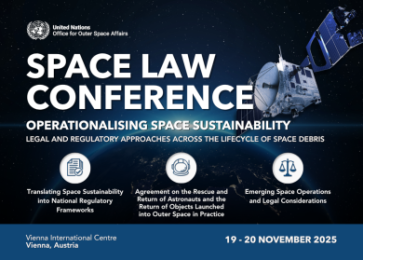
The United Nations Office for Office for Outer Space Affairs has been organizing a series of workshops and conferences on space law and policy over a decade. This year, the Office will hold the United Nations Conference on Space Law and Policy from 19 to 20 November in Vienna, Austria.
Collaboration at both international and regional levels in the peaceful use of outer space is essential for ensuring that the advantages of space-based technologies are accessible to a broad spectrum of stakeholders, including governmental and non-governmental actors. Such cooperation also supports the expansion and diversification of national space initiatives. Sound policy and legal frameworks—developed and implemented at national, regional, and global levels—are fundamental to enabling countries, especially those still developing, to address sustainable development challenges and achieve their development priorities. As such, there is an ongoing need to reinforce the links between space law and the practical implementation of space activities.
The UN General Assembly, in its resolutions on international cooperation in the peaceful uses of outer space, has continually emphasized the importance of legal frameworks in facilitating global space governance. These resolutions have underlined the relevance of strengthening international space law and the value of widespread participation in the core United Nations treaties governing outer space. The Assembly has further acknowledged the critical role of major spacefaring nations in preventing the weaponization of space and in advancing peaceful international collaboration.
With the number of public and private entities engaged in space activities steadily growing, ensuring that all actors adhere to international legal norms has become increasingly urgent. The proper application of international space law depends not only on its existence but also on the degree to which policymakers and leaders understand and support it. This, in turn, highlights the importance of fostering a skilled cadre of professionals capable of offering legal expertise and raising awareness about the legal dimensions of outer space activities—something that requires accessible and robust education and training opportunities in space law and policy.
The Conference aims to encourage broader adherence to the five core United Nations space treaties and assist countries in integrating these legal instruments into their national frameworks. It will also provide a platform for discussing the legal implications of the growing number of space actors and for identifying practical solutions to address related challenges, as highlighted by experienced space law practitioners. Another key objective is to strengthen capacity-building initiatives in space law, helping States—particularly those in the Global South—advance their development agendas through more effective participation in the space sector.
Target Audience
The Conference is being planned for a total of 200 participants including decision and policy-makers from national space agencies and governmental bodies, experts from the space community, private sector representatives, researchers/students from academia that are involved in space activities, representing developing and developed nations from all economic regions.
The Office seeks to achieve the balanced participation of women and men to ensure gender parity.
How to Register?
Find more information here: 2025 UN Conference on Space Law and Policy, 19-20 November 2025
Registration deadline for funded participants (in-person attendance): 6 p.m., 29 August 2025 (Vienna Time)
Registration deadline for self-funded participants (in-person attendance): 6 p.m., 30 September 2025 (Vienna Time)
Registration deadline for online participants: 6 p.m., 5 November 2025 (Vienna Time)
